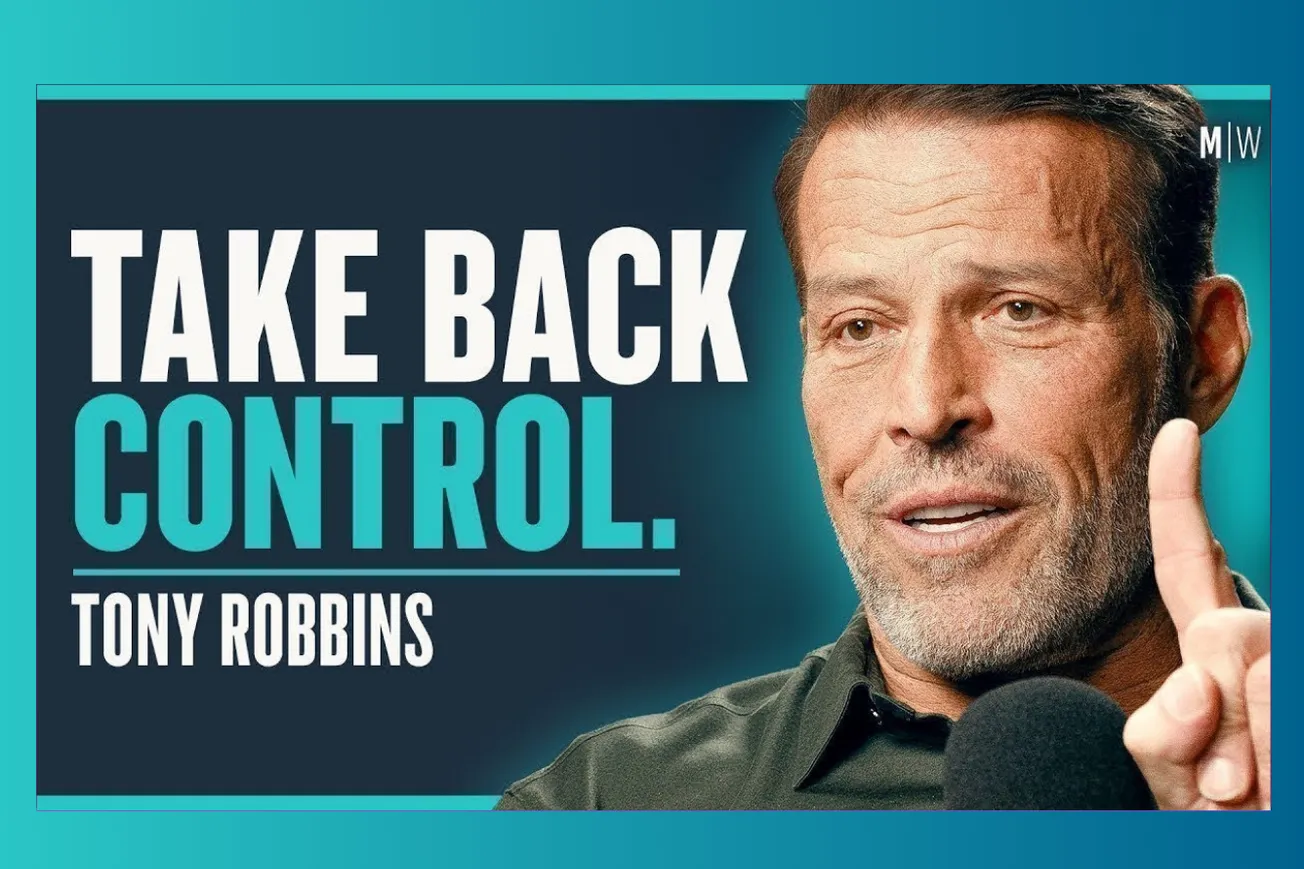Table of Contents
In this transformative conversation, world-renowned peak performance coach Tony Robbins reveals the fundamental choices that shape every moment of human experience and how mastering them can revolutionize your entire existence.
Key Takeaways
- Self-esteem comes from doing incredibly difficult things, not from external praise or positive self-talk
- Three unconscious decisions control your life: what you focus on, what meaning you give it, and what action you take
- Most successful people focus on what's missing rather than what they have, creating perpetual dissatisfaction despite achievement
- Pre-framing situations before they happen is more powerful than trying to reframe them afterward
- Life happens for you, not to you—every experience serves a higher purpose if you're willing to find it
- Human life follows four seasons: Spring (0-21), Summer (22-42), Fall (43-63), and Winter (64+), each requiring different approaches
- Pattern recognition is the most crucial skill for navigating rapid change and uncertainty
- True fulfillment comes from finding something you care about more than yourself
- The quality of your life equals the quality of your emotions, regardless of external circumstances
Timeline Overview
- 00:00–20:00 — Self-esteem fundamentals, the Bruce Springsteen comparison story, and why being hard on yourself isn't necessarily bad
- 20:00–40:00 — The three fundamental decisions framework: focus, meaning, and action that control every moment of life
- 40:00–60:00 — Focus patterns: what's missing vs. what you have, and why most achievers struggle with sustainable happiness
- 60:00–80:00 — The mercury poisoning aside and continued exploration of control vs. uncontrollable factors in life
- 80:00–100:00 — Pre-framing, reframing, and deframing techniques for managing life's challenges and opportunities
- 100:00–120:00 — Personal transformation stories, including the 700-pound man who lost 300+ pounds during COVID events
- 120:00–140:00 — Energy management, pre-event rituals, and the balance between preparation and spontaneous flow
- 140:00–160:00 — Overcoming childhood trauma, the hero's journey, and why forgiveness isn't always necessary
- 160:00–180:00 — Life seasons framework: understanding which phase you're in and what each requires for success
- 180:00–200:00 — Pattern recognition skills, historical perspective on current challenges, and preparing for rapid technological change
Self-Esteem: The Inconvenient Truth About Building Genuine Confidence
- Self-esteem cannot be given to you by others—it must be earned through your own actions, regardless of how much praise or criticism you receive throughout life
- The most effective path to genuine self-respect involves consistently doing incredibly difficult things, especially when those actions serve purposes beyond your own immediate gratification
- Being hard on yourself isn't inherently destructive if you also celebrate victories and maintain perspective about your progress over time
- Finding something you care about more than yourself eliminates self-esteem problems because you stop obsessing over your own perceived inadequacies
- External validation, whether positive or negative, has limited power over your core sense of self-worth when you develop internal standards based on meaningful action
- The Bruce Springsteen stadium comparison illustrates how unfair comparisons can temporarily derail confidence, but perspective reveals the arbitrary nature of such judgments
Many people seek self-esteem through external validation or positive self-talk, but Robbins argues this approach fundamentally misunderstands how genuine confidence develops. True self-respect emerges from consistently pushing yourself beyond comfort zones in service of meaningful goals.
The Three Decisions That Control Every Moment of Your Life
- Every moment, you make three decisions that determine your experience: what to focus on, what meaning to assign, and what action to take
- These decisions usually happen unconsciously, creating repetitive patterns that shape your entire life trajectory and emotional state
- The Thanksgiving story from Robbins' childhood demonstrates how different people can experience the same event completely differently based on their focus and meaning-making
- Your father focused on his failure to provide, while young Tony focused on the miracle of receiving food—same situation, opposite emotional experiences
- "We don't experience life; we experience the life we focus on," making attention direction the most fundamental skill for wellbeing
- Most people focus on what's missing rather than what they have, creating a permanent state of lack regardless of their actual circumstances
The meaning you assign to events creates your emotional state, which then drives your decisions and actions. If someone challenges you, the meaning could be disrespect (creating anger), coaching (creating curiosity), or love (creating gratitude). Each interpretation leads to completely different responses and outcomes.
Focus Patterns: The Achievement Trap That Destroys Happiness
- Most successful people habitually focus on what's missing rather than what they have, creating drive but preventing sustainable fulfillment
- This pattern explains why achievers often experience depression despite external success—they're running software designed for scarcity, not abundance
- COVID dramatically increased the number of people focused on what was taken away, leading to widespread mental health challenges across all demographics
- Focusing on what you can't control versus what you can control creates unnecessary anxiety and feelings of helplessness in challenging situations
- Most achievers spend excessive time in the future through anticipation, which provides power and control but robs them of present-moment joy
- The video game analogy illustrates why anticipation becomes addictive—it provides a sense of control and preparation that feels like power
During the pandemic, Robbins observed massive increases in people focusing on what was missing from their lives. This shift in attention patterns, more than the actual circumstances, drove much of the emotional suffering people experienced during lockdowns and restrictions.
Mastering Meaning: Pre-Framing, Reframing, and Deframing
- Pre-framing involves setting up the meaning of an experience before it happens, which is far more effective than trying to change meaning afterward
- The BMW car salesman story demonstrates pre-framing in action—being told the car would "dig into the road" before experiencing construction bumps
- Daily priming rituals train your nervous system to interpret experiences through specific emotional filters, particularly gratitude, which cannot coexist with fear or anger
- Robbins' morning routine involves ten minutes of breathing, gratitude practice, compassion meditation, and visualization of goals as already achieved
- Reframing requires changing established meanings after they've formed, which demands more energy and often meets psychological resistance from existing patterns
- Deframing involves destroying someone's frame of reference entirely, as illustrated by the story of "firing" the complaining seminar participant
The Harvard coffee study reveals how unconscious priming affects our interpretations—people given hot coffee described story characters as warm and genuine, while those given iced coffee saw the same characters as cold and uncaring. This demonstrates how environmental factors constantly influence our meaning-making without awareness.
Personal Transformation and the Hero's Journey
- Robbins has personally worked with over 15 million people through live events, providing unprecedented insight into what drives human transformation at scale
- The 700-pound man's story illustrates how extreme circumstances can create breakthrough moments when the right environment and support converge
- Immersive experiences accelerate learning because they engage all senses simultaneously, similar to language immersion being more effective than classroom study
- COVID forced innovation in delivery methods, leading to virtual events reaching 383,000 people instead of the usual 15,000-20,000 attendees
- True transformation requires both intellectual understanding and emotional engagement—being "in your head" alone never creates lasting change
- The hero's journey pattern applies to everyone: ordinary life, call to adventure (often disguised as crisis), meeting mentors, battling dragons, and returning transformed
Environmental design plays a crucial role in transformation. Robbins built underground facilities with squash courts and entertainment spaces because convenience and fun accelerate the adoption of positive behaviors. When healthy activities are easier and more enjoyable than destructive ones, transformation becomes sustainable.
Energy Management and Peak Performance Rituals
- Peak performance requires both foundational fitness and specific pre-event rituals that prepare the nervous system for optimal states
- Robbins' preparation involves reviewing passionate beliefs, studying current examples, physical conditioning, and spiritual alignment through prayer
- The balance between detailed planning and spontaneous response creates artistry—over-preparation provides confidence while flexibility maintains authenticity
- "Use me, Lord" represents the transition from ego-driven performance to service-oriented flow states where natural abilities can emerge fully
- Reading thousands of participant forms creates pattern recognition that allows addressing common challenges even without remembering specific individuals
- Cold exposure, breathing techniques, and movement all contribute to the physiological foundation required for sustained high-energy output
The distinction between "push" and "pull" motivation becomes crucial for long-term sustainability. Push motivation requires constant willpower and eventually depletes, while pull motivation draws energy from compelling visions and purposes that naturally energize rather than drain.
Overcoming the Past Without Forgiveness
- Robbins reframes childhood abuse and poverty as essential experiences that created his capacity for helping others rather than wounds requiring healing
- The concept of "soul contracts" suggests that challenging experiences serve higher purposes in developing character and capability for service
- Biography is not destiny—your past experiences do not determine your future outcomes unless you allow them to control your focus and meaning-making
- The African-American and Hispanic youth story demonstrates how sharing vulnerability creates connection and breaks down assumptions about privilege and opportunity
- "Life happens for you, not to you" requires finding the wisdom and strength that difficult experiences developed, even while acknowledging their pain
- Forgiveness implies wrongdoing, but from a higher perspective, experiences that shaped your capacity to serve were necessary for your development
This perspective doesn't minimize real trauma or suggest that abuse is acceptable. Instead, it focuses on extracting maximum value from experiences that cannot be changed, transforming pain into power through service to others who face similar challenges.
The Four Seasons of Human Life
- Spring (0-21): Natural growth period where development happens easily and you're protected from major responsibilities and consequences
- Summer (22-42): Testing period that humbles initial confidence and teaches real-world skills through challenges and potential failures
- Fall (43-63): Power phase where accumulated experience and skill create exponential results with less effort than previous decades required
- Winter (63+): Wisdom period characterized by peace, service, and freedom from needing to prove yourself to others or maintain ego defenses
- Understanding your current season helps optimize strategies and expectations rather than fighting against natural developmental cycles
- Most people experience the summer period as their most difficult time because reality doesn't match spring optimism about effortless success
Robbins observes that recognizing these patterns allows anticipation rather than reaction to life stages. Young achievers can prepare for summer challenges, while those in their power phase can appreciate their capacity without taking it for granted.
Pattern recognition becomes essential for navigating massive technological disruption. Self-driving vehicles will eliminate millions of jobs within the next decade, but those who understand historical patterns of technological displacement can prepare and adapt rather than becoming victims of change.
The next decade will bring more transformation than all of human history combined through artificial intelligence, nanotechnology, and robotics. Success requires developing pattern recognition skills, using established patterns for mastery, and eventually creating new patterns for unprecedented challenges.
Tony Robbins reveals that fulfillment comes not from achieving external goals but from aligning your daily decisions with purposes larger than yourself. When you master the three fundamental choices of focus, meaning, and action, you gain control over your experience regardless of circumstances beyond your influence.





